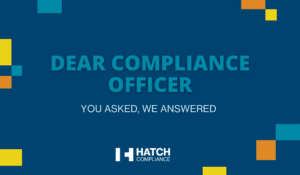
Hatch offers a complete and trackable system to manage All Compliance and Operations needs for a Behavioral Healthcare Company.
Key Pages
- Home
- About Us
- Partners
- Dear Compliance Officer
- FAQs
- Newsroom
- Feature Requests
- Release Notes
We are happy to announce a free service to help treatment providers offer the best service possible. Dear Compliance Officer is a web resource where you can go for straight to the point answers on compliance related questions by searching the archives of other peoples' questions or anonymously asking your own.

Although The Joint Commission (TJC) no longer requires you to collect proof of vaccination, they do require you to track data around why people are NOT getting vaccinated. Additionally, you should be reviewing this data before Flu season each year. Your Annual Flu program should plan to provide education to staff, using the declination reasons to empower and encourage them to get vaccinated.
Ultimately, you need to see what your State regulations say about Influenza and COVID19 vaccinations and Tuberculosis screens. States such as New Jersey have clear requirements that very specific requirements around Tuberculosis (TB), Measles Mumps Rubella (MMR), and Physical Examinations.
Each state requires similar incidents to be reported, such as abuse, exploitation, and neglect. However, reportable incidents can vary significantly. These requirements are often found in the Substance Use Disorder (SUD) / Mental Health (MH) regulations.
Where states differ vastly is how you can submit a report. Don’t wait to the last minute to figure this out. Incidents that are reportable to the state have time windows in which an incident must be submitted, and in many states, you have to enroll in their incident reporting system which could take days or even weeks, causing you to miss the reporting window and potentially end up with an inspection or fines.
On the Hatch Incident Reporting form, we have clearly outlined:
• What is a reportable incident?
• When does it need to be reported?
• How do I report an incident?
You should track incidents whether they are required to be reported or not, and some states do require that you track all incidents.
This is a great way to collect lots of objective data about your program, and improve performance.
If the State or accrediting body does not require a written policy, then it’s not necessary.
With that said, we recommend that you do, because it is a good idea to have a written process surrounding something you are required to do.
In the words of Brene Brown: “Clear is kind. Unclear is unkind!“
So, long story short, YES!
Each state has different regulatory requirements, so this really depends on your state.
A majority of the states have regulations around Substance Use Disorder (SUD) treatment.
For Mental Health (MH) treatment, most states have regulations, but a few have no regulations for Outpatient Mental Health.
Very few states have Eating Disorder (ED) specific regulations, but with Eating Disorders on the rise, lawmakers are seeking legislative answers.
If we look at The Joint Commission (TJC) / CARF, they do have varied, additional standards around the populations served.
Patient satisfaction, Staff satisfaction, Staff safety, Against Medical Advice (AMA) / Against Therapeutic Advice (ATA) rates, and average length of stay are some of the ways Compliance assists in driving revenue.
Maximizing length of stay and patient care allows less patient admissions and documentation, which is part of compliance, ultimately assists in increasing revenues.
Additionally, if staff are not trained properly, or if you are paying overtime to prepare for an inspection or survey, you are time and money.

We are a Team of Former Inspectors, Compliance Officers, Developers, and Healthcare Executives who saw a real need for a functional, analytical, and optimized platform for facilities. With our 40,000+ hours of experience, and painstaking creative efficiency – We designed Hatch.
Founder & Chief Compliance Officer
Although The Joint Commission (TJC) no longer requires you to collect proof of vaccination, they do require you to track data around why people are NOT getting vaccinated. Additionally, you should be reviewing this data before Flu season each year. Your Annual Flu program should plan to provide education to staff, using the declination reasons to empower and encourage them to get vaccinated.
Ultimately, you need to see what your State regulations say about Influenza and COVID19 vaccinations and Tuberculosis screens. States such as New Jersey have clear requirements that very specific requirements around Tuberculosis (TB), Measles Mumps Rubella (MMR), and Physical Examinations.
Each state requires similar incidents to be reported, such as abuse, exploitation, and neglect. However, reportable incidents can vary significantly. These requirements are often found in the Substance Use Disorder (SUD) / Mental Health (MH) regulations.
Where states differ vastly is how you can submit a report. Don’t wait to the last minute to figure this out. Incidents that are reportable to the state have time windows in which an incident must be submitted, and in many states, you have to enroll in their incident reporting system which could take days or even weeks, causing you to miss the reporting window and potentially end up with an inspection or fines.
On the Hatch Incident Reporting form, we have clearly outlined:
You should track incidents whether they are required to be reported or not, and some states do require that you track all incidents.
This is a great way to collect lots of objective data about your program, and improve performance.
This is regulated by each state. Check your regulations to be sure.
A training can be interactive or completed solely by the user. For example, staff can take a training through a Learning Management System (LMS).
You can assess competency by administering a quiz after the quiz to see if the staff member’s knowledge is sufficient (think C level proficiency), but you will need to ensure that you are ‘testing’ for a comprehensive understanding of the topic.
A competency is administered by someone with experience and assesses the skills of a staff member. A competency should be an interactive event.
Remember that all of the above should be documented, and a part of the employee’s Human Resources (HR) file.
If the State or accrediting body does not require a written policy, then it’s not necessary.
With that said, we recommend that you do, because it is a good idea to have a written process surrounding something you are required to do.
In the words of Brene Brown: “Clear is kind. Unclear is unkind! “
Yes, you do.
Obtaining an Opioid Treatment Program (OTP) certification is a lengthy process, similar to spinning plates, and the plates are on fire.
You have to deal with multiple agencies (State, SOTA, SAMSHA, DEA, and an accrediting body) simultaneously, sometimes running from one plate to the other to make sure they stay spinning.
If this is something you’ve never done before, I would suggest reaching out to someone with experience to help you. To connect with an expert for guidance, you can reach out to the Hatch Compliance team – info@hatchcompliance.com
So, long story short, YES!
Each state has different regulatory requirements, so this really depends on your state.
A majority of the states have regulations around Substance Use Disorder (SUD) treatment.
For Mental Health (MH) treatment, most states have regulations, but a few have no regulations for Outpatient Mental Health.
Very few states have Eating Disorder (ED) specific regulations, but with Eating Disorders on the rise, lawmakers are seeking legislative answers.
If we look at The Joint Commission (TJC) / CARF, they do have varied, additional standards around the populations served.
This depends on the state you’re providing service in and what population is being served.
With that being said, some telehealth operators are neither licensed nor accredited. This opens them up to certain liabilities, and additionally they cannot bill as a facility. If you are going the unlicensed / unaccredited route – ask your attorney or a Hatch consultant if you need to set up a Friendly Professional Corporation (PC) model.
Incidents are bound to happen in your facility. It may not be a critical incident, but it could become one if not addressed.
As soon as an event or repetitive events occur, such as seeing that 3 slip / falls happened last month, or an issue with medication orders, such as finding that the wrong medication is continually being administered due to incorrect reading of doctors orders, you need to get started on planning your corrective actions.
To craft a stellar Corrective Action Plan (CAP) we recommend you look at several factors:
You can, but you probably won’t get paid. Some insurance companies have internal policies that disallow holistic services. They don’t share these policies with you. Payors like Optum have cherry-picked the ASAM to determine that certain tried and true groups are not billable.
Patient satisfaction, Staff satisfaction, Staff safety, Against Medical Advice (AMA) / Against Therapeutic Advice (ATA) rates, and average length of stay are some of the ways Compliance assists in driving revenue.
Maximizing length of stay and patient care allows less patient admissions and documentation, which is part of compliance, ultimately assists in increasing revenues.
Additionally, if staff are not trained properly, or if you are paying overtime to prepare for an inspection or survey, you are time and money.
Policies should be written and created by someone who understands your business internally from the following areas:
Benefits of exceptional policy creation:
This contributes to a smoothly running organization and better results, as compared to having a policy just to check the boxes.
If you hired a consultant to write your policies, and they did not interview your staff at length, you policies most likely do not represent what you are actually doing.
It’s better to NOT have a policy than it is to have a policy that is incorrect.
Call (888) HATCH-30 to speak with one of our Business Consultants or schedule a consultation
Hatch Compliance provides all the necessary tools for your Human Resources requirements.
Role based learning management system that meets all accrediting body standards. All training and quizzes are automatically assigned to the user, depending on their role in the organization
Includes pre- made competency assessments to meet all accrediting body standards.
Includes all pre- made forms to meet all accrediting body standards.